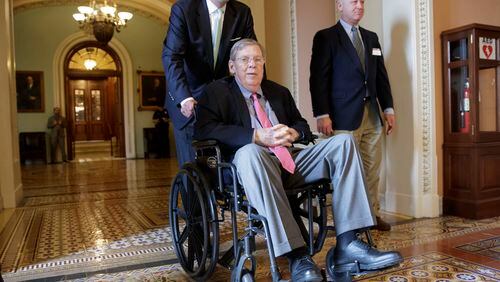Georgia U.S. Sens. Johnny Isakson and David Perdue are not seen as swing votes on the Republican health care bill.
As key allies to Senate GOP leaders and President Donald Trump, both are viewed as relatively reliable “yes” votes for Senate Majority Leader Mitch McConnell.
But that hasn't stopped the two GOP lawmakers from looking to secure last-minute benefits for Georgia's sickest children and some of the state's medical providers as McConnell feverishly renegotiates portions of the Better Care Reconciliation Act to win over enough GOP holdouts.
Near the top of Isakson and Perdue’s wish lists is a change that could send more money to safety net hospitals such as Grady and South Fulton Medical Center in Atlanta. Another aims to have the government pay more to local health care providers who treat needy children.
Gov. Nathan Deal has been quietly working with members of Georgia’s congressional delegation to ensure that the state does not lose out under the bill for its decision not to accept more federal funding for adding more adults to the Medicaid rolls.
"As I have said before, we want to make sure we are not punished because we did not expand our Medicaid population," the second-term Republican said in an interview last week, adding, "We want to be treated fairly."
One of the most pressing items on the to-do list for the state's lawmakers has been ensuring that Georgia does not end up locked into a system that leads to far less federal money heading its way. The state has some of the country's lowest health care spending per capita, according to the Kaiser Family Foundation, and had the nation's second-highest uninsured rate in 2015.
The Senate plan would keep additional dollars flowing to the 31 states that chose to expand Medicaid through the end of 2023.
Isakson, with Perdue's blessing, met recently with McConnell to ask him to tweak the way the government funds charity hospitals under the so-called Disproportionate Share Hospital program so that more funding would land in non-expansion states such as Georgia, particularly if there is an increase in uninsured patients.
A Congressional Budget Office analysis found the original Senate bill would increase payments to those safety net hospitals in Georgia and the 18 other non-expansion states by a total of $19 billion over 10 years.
Isakson’s proposed change seeks to send extra money to the charity hospitals that treat more low-income and uninsured people than their average counterparts. Those so-called safety net hospitals tend to operate on very thin financial margins because they often aren’t compensated in a timely manner — or at all — for the care they provide to the uninsured. That’s why the government often provides such hospitals additional funding.
Georgia State University Professor Bill Custer estimated that roughly 680,000 more Georgians would go without insurance over 10 years if the Senate GOP bill became law.
The Georgia senators are also asking party leaders to exempt children with medically complex conditions such as Down syndrome or congenital heart disease from the GOP’s proposed Medicaid overhaul.
Both the House and Senate bills would shift Medicaid, which covers about one-in-five Georgians, from an open-ended entitlement in which states and the federal government pay for all of a patient’s eligible medical expenses to a grant program in which Washington hands the states a lump sum each year.
The changes are aimed at bringing the program's ballooning costs under control and granting the states more flexibility to implement the kinds of health care programs they want. But opponents argue it could blow holes in state budgets since they would be responsible for covering any shortfalls.
Isakson and Perdue are not opposed to overhauling Medicaid, but they have expressed concerns that children fighting serious diseases and the hospitals that treat them could be unintentionally harmed.
The two have proposed exempting such children from the Medicaid changes in order to keep the funding flowing just as it currently does under the open-ended program. The current bill already exempts blind and disabled children under 19 and people with tuberculosis, among others. That means those hospitals would have to worry less about being compensated for care and the families would know their child's care would continue to be paid for by the government.
“We want to make sure the medically complex kids that are in our children’s hospitals still have the benefits they have today and don’t get unintentionally cut or unintentionally reduced,” Isakson said, “and that the hospitals that provide those services don’t” wind up in the red.
Grady and the Children’s Healthcare of Atlanta, two of the city’s largest safety net providers, declined to comment on the proposal.
McConnell has not shown any signs about how exactly he will tweak the health care bill in his second draft, but the Kentucky Republican previously indicated he would like the Congressional Budget Office to determine the impact of suggested changes in the week ahead so senators can vote on a new proposal in mid-July.
It’s unclear whether Isakson and Perdue’s proposals will end up in the next draft of the legislation. While Isakson met with McConnell last week, Perdue has been working with his contacts at the White House. He huddled with Trump on Friday, a spokeswoman said, to discuss health care and other issues.
“I want something that’s better than the ACA,” Perdue said, referring to Obamacare. “It doesn’t have to be perfect, it’s not going to be perfect, and this is step one.”








